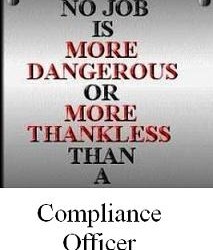
BrokerDealer.com blog update courtesy of extract from WSJ’s “The Most Thankless Job on Wall Street” by reporter Emily Glazer, with sub title courtesy of our inhouse curator: “Who really wants to be a compliance officer?!”
Those officers on Wall Street in charge of ensuring that traders and other employees stay on the right side of laws and regulations are increasingly in the cross hairs themselves. And, not in the context of traders aiming spitballs at the compliance cops whose job, according to traders and sales/traders is to (i) be annoying by blocking every move, including the one to the restroom (ii) pretend they are cops, because they couldn’t pass the local police dept application exam (iii) have an opinion about the nuance within every email or chat message.
Several recent enforcement actions found compliance officers personally liable for mistakes within their firms. Meanwhile, New York’s principal financial regulator, backed by New York Gov. Andrew Cuomo, wants the power to seek criminal charges against compliance officers in some cases.
Compliance officers are “shaking in their boots,” said Carrie Mandel, a member of recruiter Spencer Stuart’s legal, compliance and regulatory practice. She is among a number of recruiters, lawyers and executives who say the heightened accountability is driving experienced people to be more cautious about the profession and making it difficult for banks to find replacements.
Around three dozen senior bank-compliance executives left their jobs in 2015, three times the number of a year earlier, said Daniel Solo, a managing director at recruiter Sheffield Haworth. Most of those were in positions overseeing anti-money laundering or financial crime, he said.
Compliance officers say they feel unfairly singled out.
“It’s easier for firms to give up their compliance officer, because what are they going to do, give up the CEO?” asked a compliance officer who has worked for large U.S. and foreign banks.
Since the financial crisis, banks have hired compliance officers by the thousands to address internal issues that led to massive fines. They are also often responsible for getting banks to adapt to the flood of new regulations in recent years.
While industry-wide figures aren’t available, many banks have touted their investment in this area: J.P. Morgan Chase & Co., the country’s biggest bank by assets, said in its annual CEO shareholder letter in April that the firm added 8,000 compliance employees.
When Goldman Sachs Group Inc. recently said it had increased its head count by 8% to 36,800 in 2015, the firm cited compliance as the main area of growth.
To keep reading Emily Glazer’s column, click here
The demand for qualified people is driving up salaries, with chief compliance officers at some large banks earning more than $2 million a year, according to recruiters and compliance executives. Specialists in anti-money laundering executives can earn more than $600,000.
Regulators are also focusing on who the compliance executives report to. The Office of the Comptroller of the Currency recently told some big banks that it doesn’t want the compliance officers to report to executives who run businesses directly, people familiar with the matter said.
The idea is to give compliance officers more independence from those executives who help set policies and manage people in the field.
At J.P. Morgan, the chief compliance officer may begin reporting this year to the chief risk officer or another executive, instead of the chief operating officer, people familiar with the matter said.
Regulators increasingly want to make sure compliance officers aren’t merely rubber-stamping bank decisions and that there are penalties in place when the executives willfully overlook bad behavior or fail to see it through monitoring systems they have signed off on.
In a November speech before the National Society of Compliance Professionals, Andrew Ceresney, director of the SEC’s Enforcement Division, said the agency sees itself as being on the same side as compliance officials in terms of being watchdogs for potential wrongdoing.
He said he was aware of the concern within the industry over the recent enforcement actions but stressed that the agency brought cases “only when the conduct crossed a clear line.”
In April 2015, the SEC fined Bartholomew A. Battista, chief compliance officer at BlackRock Advisors LLC, $60,000 for failing to report a conflict of interest involving one of the firm’s executives, according to the SEC. The executive invested $50 million of his money in a family-owned energy company, which became a joint venture with another company that was a major holding in a fund he managed, an arrangement the SEC said was a breach of fiduciary duty. Mr. Battista was aware of the conflict and didn’t report it.
BrokerDealer.com provides the global financial industry’s most comprehensive database of broker-dealers and regulated bankers operating in more than 30 countries throughout the free world
The penalty was the agency’s first under a 2003 rule allowing it to hold compliance officers liable for such mistakes. Mr. Battista and BlackRock neither admitted nor denied wrongdoing.
That case, along with a similar action in June involving another firm that the SEC disclosed, prompted then-SEC commissioner Daniel Gallagher to write the only dissent of an enforcement action in his four-year tenure.
Mr. Gallagher, a Republican, wrote that the agency “should strive to avoid the perverse incentives that will naturally flow” from targeting the officers who are on the front lines in preventing wrongdoing. He said the SEC “seems to be cutting off the noses of [chief compliance officers] to spite its face.” Mr. Gallagher left the agency in October.
Other regulators, including the Financial Industry Regulatory Authority and the Treasury Department’s Financial Crimes Enforcement Network, have taken actions against compliance officers in the last two years.
In response, some executives are increasingly seeking their own lawyers, asking for more protection in employee contracts and requesting banks pay for liability insurance coverage, said Richard Marshall, a partner at Katten Muchin Rosenman LLP who has represented compliance officers.
The issue could come to a head soon.
The proposed rules by New York’s Department of Financial Services, which regulates some of the world’s largest banks, would require compliance officers to certify bank systems for monitoring suspicious transactions that violate U.S. economic sanctions and other rules.


